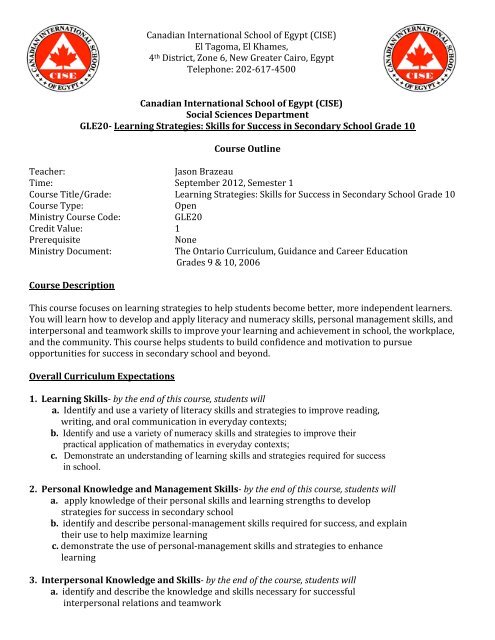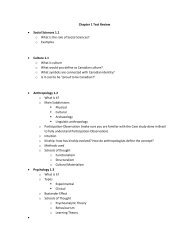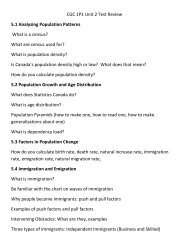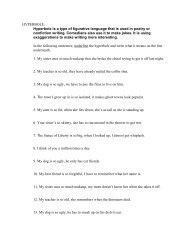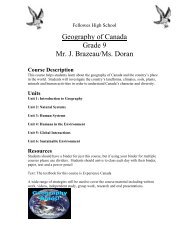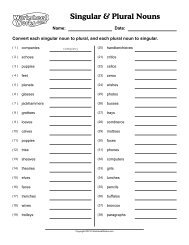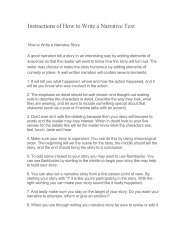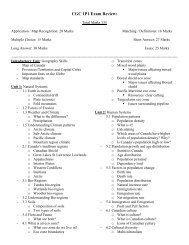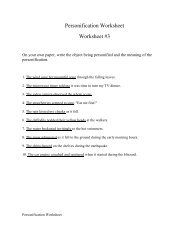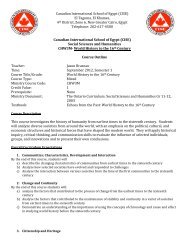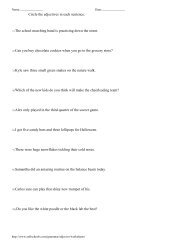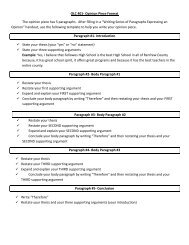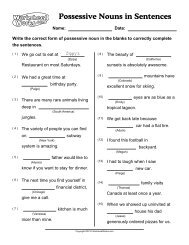CISE GLE20 Course Outline Students.pdf
CISE GLE20 Course Outline Students.pdf
CISE GLE20 Course Outline Students.pdf
You also want an ePaper? Increase the reach of your titles
YUMPU automatically turns print PDFs into web optimized ePapers that Google loves.
Canadian International School of Egypt (<strong>CISE</strong>) <br />
El Tagoma, El Khames, <br />
4 th District, Zone 6, New Greater Cairo, Egypt <br />
Telephone: 202-‐617-‐4500 <br />
Canadian International School of Egypt (<strong>CISE</strong>) <br />
Social Sciences Department <br />
<strong>GLE20</strong>-‐ Learning Strategies: Skills for Success in Secondary School Grade 10 <br />
<strong>Course</strong> <strong>Outline</strong> <br />
Teacher: <br />
Time: <br />
<strong>Course</strong> Title/Grade: <br />
<strong>Course</strong> Type: <br />
Ministry <strong>Course</strong> Code: <br />
Credit Value: <br />
Prerequisite <br />
Ministry Document: <br />
Jason Brazeau <br />
September 2012, Semester 1 <br />
Learning Strategies: Skills for Success in Secondary School Grade 10 <br />
Open <br />
<strong>GLE20</strong> <br />
1 <br />
None <br />
The Ontario Curriculum, Guidance and Career Education <br />
Grades 9 & 10, 2006 <br />
<strong>Course</strong> Description <br />
This course focuses on learning strategies to help students become better, more independent learners. <br />
You will learn how to develop and apply literacy and numeracy skills, personal management skills, and <br />
interpersonal and teamwork skills to improve your learning and achievement in school, the workplace, <br />
and the community. This course helps students to build confidence and motivation to pursue <br />
opportunities for success in secondary school and beyond. <br />
Overall Curriculum Expectations <br />
1. Learning Skills-‐ by the end of this course, students will <br />
a. Identify and use a variety of literacy skills and strategies to improve reading, <br />
writing, and oral communication in everyday contexts; <br />
b. Identify and use a variety of numeracy skills and strategies to improve their <br />
practical application of mathematics in everyday contexts;<br />
c. Demonstrate an understanding of learning skills and strategies required for success<br />
in school.<br />
2. Personal Knowledge and Management Skills-‐ by the end of this course, students will <br />
a. apply knowledge of their personal skills and learning strengths to develop <br />
strategies for success in secondary school <br />
b. identify and describe personal-‐management skills required for success, and explain <br />
their use to help maximize learning <br />
c. demonstrate the use of personal-‐management skills and strategies to enhance <br />
learning <br />
3. Interpersonal Knowledge and Skills-‐ by the end of the course, students will <br />
a. identify and describe the knowledge and skills necessary for successful <br />
interpersonal relations and teamwork
. assess their interpersonal and teamwork skills and strategies, and explain how <br />
those skills requiring further development affect their learning <br />
c. demonstrate the ability to apply appropriate interpersonal and teamwork skills in a <br />
variety of learning environments <br />
4. Exploration of Opportunities-‐ by the end of the course, students will <br />
a. apply their knowledge of school, work, and community involvement opportunities<br />
to develop a personal learning plan<br />
b. demonstrate an understanding of school and community resources and how these<br />
can be utilized to support their learning needs<br />
c. develop a portfolio of documents pertaining to self-assessment, research, and<br />
career exploration that are necessary for planning a pathway for secondary school success<br />
Description of <strong>Course</strong> Units<br />
Unit Title Time <br />
1 Becoming a Self-‐Directed Learner: Personal Knowledge and <br />
16 <br />
Management Skill <br />
2 Becoming a Reflective Learner: Learning and Thinking Skills 20 <br />
3 Becoming a Lifelong Learner: Applying Personal Management <br />
18 <br />
Skills and Planning for Learning <br />
4 Becoming an Effective Learner: Literacy and Numeracy 18 <br />
5 Becoming a Collaborative Learner: Working in Groups and <br />
18 <br />
Learning Through the Community <br />
6 Culminating Unit 20 <br />
Total <br />
110 Hours <br />
Mark Breakdown and Assessment Evaluation <br />
Your level of performance on a number of activities will determine your midterm and final grades. Each of <br />
the activities you complete in this course (including tests) will be directly tied to the following achievement <br />
areas: <br />
-‐ Knowledge and Understanding (evaluation of your knowledge of facts and terms and understanding of concepts and <br />
theories) <br />
-‐ Thinking/Inquiry (evaluation of your critical and creative thinking and inquiry skills) <br />
-‐ Communication (evaluation of your ability to communicate information and ideas in a variety of ways) <br />
-‐ Application (evaluation of your ability to transfer ideas, draw conclusions, make predictions, and make connections)
ASSESSMENT & EVALUATION <br />
Essential Evidence <br />
A. COURSE WORK 70% <br />
-‐Quizzes, Tests, Assignments, Projects <br />
B. CULMINATING ACTIVITIES <br />
1: Culminating Activity 30% <br />
NOTE: SOME ASSESSMENT/ EVALUATION COMPONENTS MAY BE ALTERED DEPENDING ON TOPIC INTEREST, CLASS DEMAND OR <br />
TIME CONSTRAINTS. STUDENTS WILL BE MADE AWARE OF ANY CHANGES WITH AN UNDERSTANDING THAT MODIFICATIONS ARE IN <br />
THEIR BEST INTEREST. <br />
Achievement Chart <br />
Percent Grade Achievement <br />
Summary Description <br />
Range Level <br />
80-‐100% 4 A very high to outstanding level of achievement. Achievement is above <br />
the provincial standard <br />
70-‐79% 3 A high level of achievement. Achievement is at the provincial standard <br />
60-‐69% 2 A moderate level of achievement. Achievement is below but <br />
approaching the provincial standard <br />
50-‐59% 1 A passable level of achievement. Achievement is below the provincial <br />
standard <br />
Below 50% Insufficient <br />
achievement <br />
of curriculum <br />
expectations. <br />
A credit will <br />
not be <br />
granted <br />
Late Assignment Policy <br />
<strong>Students</strong> are expected to complete all assignments on time. Teachers and the principals will assist <br />
students in developing good work habits, including time management, and in developing the attitudes <br />
that lead to success in life, including pride in work done. The cooperation of parents is invited and is <br />
essential. <br />
Assignments that are late or incomplete will result in responses ranging from required completion after <br />
school hours to the development and monitoring of an action plan with the student, parent, teacher(s) <br />
and the principal.
Academic Honesty<br />
It is expected that all essays, assignments, projects and the like, presented by students for assessment, <br />
will be their own work. The advent of the Internet, which is a superb source of information for students, <br />
has led to a large increase in plagiarism the presentation of another person’s work as your <br />
own. Plagiarism includes students copying into their work, sentences, paragraphs, graphics and so on <br />
from another author, without providing an acknowledgment of the source. <br />
Plagiarism becomes an increasingly frequent problem as students get older. It is also a problem in post-secondary<br />
institutions, which regard it so seriously that they will often require a student who has been <br />
academically dishonest to withdraw from their program. The school wishes to cooperate with parents in <br />
developing students’ commitment to academically honest practices. If a student presents work for <br />
assessment that contains another person’s work, without adequate acknowledgement, the work will be <br />
returned un-‐assessed and parents will be contacted to set additional consequences, including suspension, <br />
depending on the grade and the extent of the plagiarism. <br />
Plagiarized work will be assigned a zero grade. <br />
<strong>Students</strong> are to be treated with respect and dignity. In return, they must demonstrate respect for <br />
themselves and for others through acceptable behavior. Respect and responsibility are demonstrated <br />
when a student: <br />
• Comes to school regularly, on time and ready to learn; <br />
• Is prepared for all classes by bringing required material and completing homework assignments <br />
on time; <br />
• Is responsible for any work missed in classes due to absence; <br />
• Shows respect for themselves, for others and for those in authority; <br />
• Develops self-‐discipline and shows courtesy through language and actions toward all members of <br />
the school community; <br />
• Shows respect for school property and the personal belongings of others; <br />
• Cooperates with other members of the school community; <br />
• Resolves interpersonal conflicts and difficulties through discussions with the other person or <br />
through seeking assistance from school personnel; <br />
• Refrains from bringing anything to school that may compromise the safety of others (e.g. alcohol, <br />
illegal drugs, weapons, objects which may be used as weapons); <br />
• Follows the established rules and takes responsibility for his/her actions. <br />
If you have any problems or issues throughout the year, I have an open door policy so please come and <br />
talk to me. If there is anything that I can do to help I would love to do so. You can also contact me <br />
through e-‐mail at jbrazeau@cise-‐eg.com. <br />
Thanks <br />
Jason Brazeau


